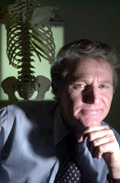Dr David McGrath
Spine Physician
MB BS (Hons) FAFOM, RACP, FAFMMMaster of Pain Medicine
Cytokines (Local Hormones)
1. Soluble GLYCOPROTEINS
2. Secreted by a specific cell type
3. Act on specific cell types
4. Generally short range (paracrine or autocrine )
5. Act on high affinity cell surface receptors
6. Regulate the transcription of cellular genes (up/down) to new cell behaviour
7. Some cytokines may "escape" into wider environment and have systemic actions
8. Activities are tightly regulated. They control local tissue homeostasis.
9. Act in concert, with a "regulation pattern"
10. Immunology is the best studied field, followed by haematology,cell biology in general and oncology
| CELL ORIGIN | TYPE | INDIVIDUAL | CELL TARGET |
| T Helper Lymphocytes (Macrophages, Monocytes) |
Lymphokines (Monokines) |
MAF (Macrophage Activating) MMIF(Migration Inhibition) MCF (Chemotactic) LMIF (Migration Inhibition) HRF (Histamine Releasing) |
Immunology |
| UNIFIED APPROACH |
Interleukins (inter-white cells) |
IL1 IL2 IL3 IL4 IL5 IL6 |
Liver Unified |
| Immunological Cells |
Tumour Necrosis Factors | TNF-alpha (Cachectin) TNF-beta (Lymphotoxin) |
Liver |
| Interferons | IFN-alpha, IFN-gamma... | Immunology | |
| Colony Stimulating Factors | G-CSF (Granulocyte) GM-CSF (Granulocyte-macrophage) M-CSF (Macrophage) Multi-CSF (IL-3) |
Haematology | |
| Polypeptide Growth Factors | aFGF (acid Fibroblast ) b FGF (base Fibroblast) EGF (Epidermal) NGF (Nerve) PDGF (Platelet ) VEGF (Vascular Endothelial) |
Cell Bilogy |
|
| Transforming Growth Factors | TGF-alpha TGF-beta |
Oncology | |
| Alpha Chemokines | IL-8 NAP-2 (Neutrophil-Activating Protein) PF-4 (Platelet Factor) Beta TG (Thromboglobulin) |
Immunology | |
| Beta Chemokines | MCP-1 (Monocyte Chemotactic) MCP-3 MIP-1 alpha (Macrophage Inflammatory Protein) MIP 1 beta RANTES |
Immunology | |
| Stress Proteins | HSPs (Heat Shock Proteins) GRP's (Glucose Regulated) Ubiquitin SOD(Mn) |
Cell Biology |
Important Relationships
1. IL1-1 and TNF-alpha stimulate acute phase proteins from liver, and Cortisol from adrenal cortex (via pituitary and ACTH ),which also stimulates acute phase proteins. Cortisol also inhibits IL-1 acting as negative feedback on the local immune reaction, reducing cytokine synthesis. The liver in essence, exerts central control of the inflammatory response away from the local tissue. (The liver is a chemical integration centre) There is a possible connection with stress, which also induces cortisol. Stress, through this mechanism could reduce local inflammation,pehaps interfering with healing. Stress might also be identified through an increase or continuing acute phase response of the liver. (ESR and CRP increases)
©Copyright 2007 Dr David McGrath. All rights reserved

